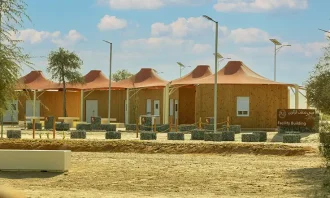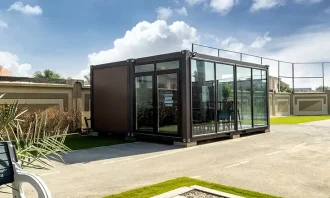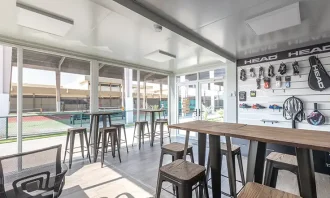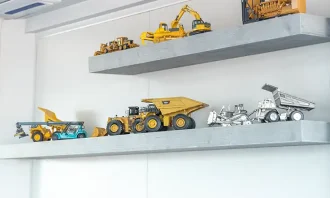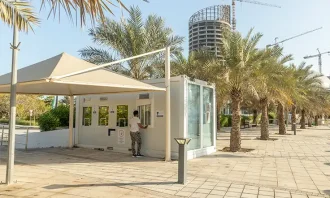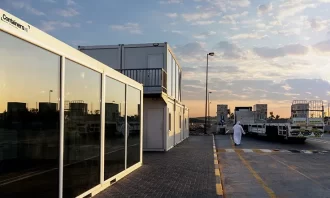Container Farming: Revolutionizing Agriculture in the UAE with Modular Containers
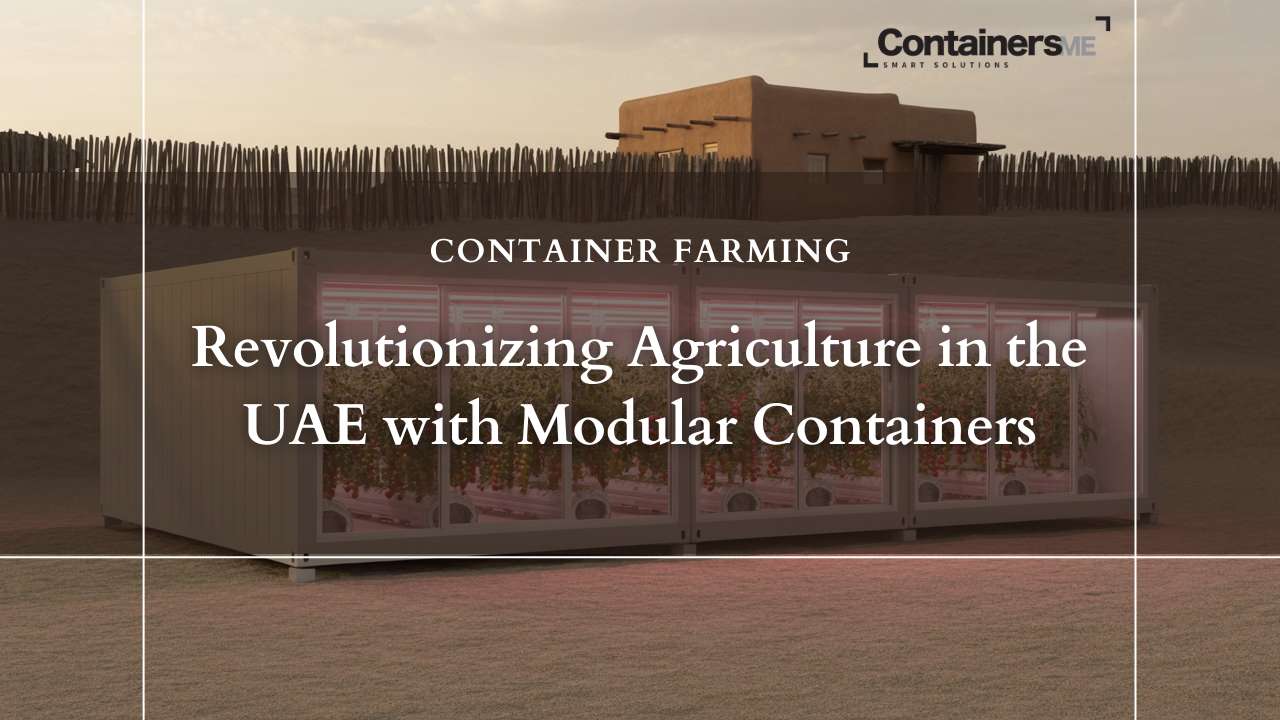
Container farming is a form of small-space indoor farming that was introduced in 2011. which is now a significant subset of the indoor agricultural industry. It is a modern form of hydroponics, utilizing prefabricated containers to cultivate plants in nutrient-rich water solutions. These containers can be configured vertically or horizontally, offering efficient space utilization. Advanced climate control systems and artificial lighting within the containers mimic natural conditions, allowing for year-round, sustainable food production, regardless of external weather conditions
Imagine increasing the efficiency and reach of your farm. Container farming is a great way to achieve sustainable growth by combining eco-friendliness with innovative design
From advanced water and nutrient setups to intelligent equipment storage, this flexibility allows you to maximise resources, reduce ongoing costs and boost output.
You will be able to see how container farming can benefit your farm.
Revolutionizing Urban Agriculture by Container Farming
Imagine having a small farm in your city or even your backyard. Well, you can! Container farming is making it possible. By transforming modular containers into hydroponic farms, you can grow fresh food all year round, no matter the weather. It’s a smart way to farm, save water and reduce waste. This new idea is helping farmers and business owners meet the growing need for local and sustainable food.
These farming methods exist in every corner of the world. Given our planet’s dwindling resources and land, these farms are a testament to human ingenuity.
Container farms are a great way to bridge the distance between farms and communities. They ensure steady growth, bringing goods closer to buyers while providing a constant flow of fresh products. They have more options than just growing plants. It’s about creating a sustainable future. Container farming offers a green, efficient, and scalable way of agriculture.
Benefits of Using Modular Containers Instead of Shipping Containers for Container Farming
When considering container farming, modular containers offer several distinct advantages over traditional shipping containers. Here’s why modular containers are the more efficient choice for farming operations: 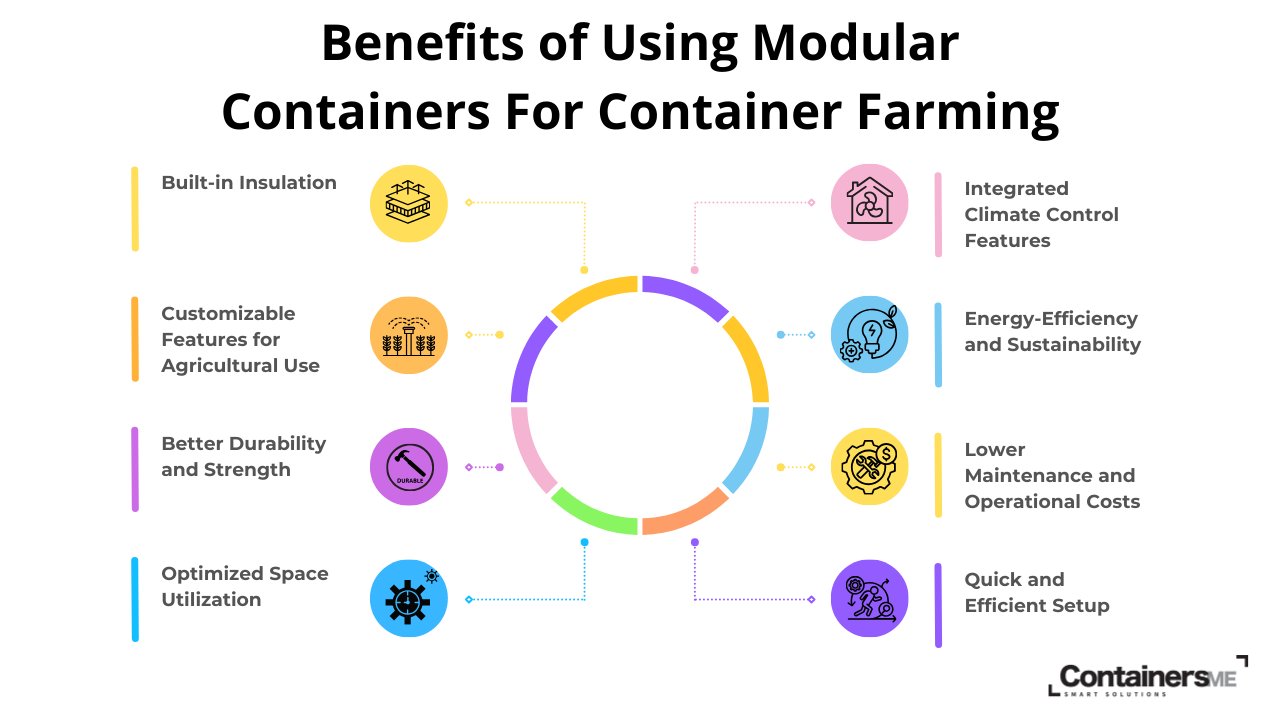
Built-in Insulation
Modular containers are designed with pre-insulated panels that help maintain a stable temperature inside the container. Unlike shipping containers, which need additional insulation to regulate the climate, modular containers naturally retain heat and reduce the need for external energy inputs. This makes them more energy-efficient and cost-effective for farming.
Customizable Features for Agricultural Use
Modular containers are specifically made for farming purposes. They come with customizable features such as built-in shelves, optimized irrigation systems, and easy-to-adjust nutrient systems that are ideal for hydroponic farming. Shipping containers, in contrast, require extensive modifications, which add to setup costs and time.
Better Durability and Strength
Modular containers are engineered for agricultural conditions and offer greater structural integrity than shipping containers, which were designed for transport. These containers are built to withstand factors like humidity, temperature fluctuations, and moisture, ensuring longer-lasting use without the need for frequent repairs.
Optimized Space Utilization
Modular containers are designed to maximize the available space for farming. They provide better airflow, lighting, and ease of access, making it easier to grow plants efficiently in smaller areas. Shipping containers may not utilize space as effectively for farming purposes and often require additional adjustments to be truly functional.
Integrated Climate Control Features
Modular containers come ready to integrate advanced climate control systems such as heating, cooling, and lighting. This allows farmers to regulate conditions more effectively, ensuring optimal growth. Shipping containers typically don’t come with this flexibility, meaning additional work and investment are needed to set up climate control systems.
Energy-Efficiency and Sustainability
These containers are built with sustainability in mind. Many come with the infrastructure to support solar energy panels or rainwater harvesting systems, making them more eco-friendly. Shipping containers can be adapted to these solutions, but it requires more work and additional costs, which can impact overall efficiency.
Lower Maintenance and Operational Costs
Due to their construction and purpose-built design, modular containers require less maintenance over time. They are easier to clean and more durable, reducing long-term costs. In contrast, shipping containers often require repairs and ongoing upkeep, making them less cost-effective in the long run.
Quick and Efficient Setup
Modular containers are pre-designed for farming and can be set up quickly without much alteration. In contrast, shipping containers require extensive retrofitting to become viable for container farming, delaying the start of your farming operation and adding unnecessary complexity to the setup process.
Benefits of Starting a Container Farming Business
Container agriculture is an excellent option for those who lack land, money, or experience in farming.
Food All Year Round
Imagine harvesting fresh, local produce regardless of the season. Indoor farming, particularly container farming, makes this a reality. Farmers can regulate temperature, humidity, and light by creating controlled environments within containers, ensuring consistent growth and year-round harvests. This benefits consumers with access to fresh, local food and stabilizes the agricultural market.
Minimum Land Needed
One of the most significant advantages of container farming is its flexibility in location. You don’t need vast land to start a farm. A small urban space, a rooftop, or even a warehouse can be transformed into a productive farm. This flexibility allows for urban agriculture, reducing the transportation distance between farm and table and minimizing the carbon footprint of food production.
Sell a High-Quality Product
controlled environments in container farms allow for optimal plant growth. Farmers can produce crops with superior flavour, texture, and nutritional value by controlling factors like nutrient levels, pH, and light intensity. This high-quality produce can command premium prices in the market, increasing farmers’ profitability.
Low maintenance and Convenience
Container farming is designed for efficiency. Many systems are automated, reducing the labour intensity of traditional agriculture. Watering, fertilizing, and pest control can be streamlined, saving farmers time and effort. This makes container farming an attractive option for both experienced farmers and newcomers to agriculture.
Resistant to moisture and pests
Container farming offers a protective environment for plants. Farmers can significantly reduce the risk of crop loss by isolating crops from outdoor pests and diseases. This ensures a reliable harvest and minimizes the need for chemical pesticides, promoting sustainable and eco-friendly farming practices.
Water and Nutrient Savings
Hydroponic systems, commonly used in container farming, are highly water-efficient. Farmers can significantly reduce water consumption compared to traditional soil-based agriculture by delivering nutrients directly to plant roots. This water-saving approach is critical in regions with water scarcity. Container farming has been shown to save up to 90 % of water and 20% on fertiliser. Additionally, nutrient solutions can be carefully tailored to the specific needs of each crop, minimizing waste and maximizing nutrient uptake
Solar Energy Potential
Harnessing solar energy can make container farms even more sustainable. Farmers can generate clean, renewable energy to power their operations by installing solar panels on container roofs or nearby structures. This reduces reliance on fossil fuels and lowers energy costs, making container farming more economically viable and environmentally friendly.
Boosting flavour, reliability, and freshness
Controlled environment agriculture (CEA) techniques employed in container farming, provide optimal plant growth conditions. Farmers can produce crops with superior flavour, texture, and nutritional value by precisely controlling factors like temperature, humidity, and light. This enhanced quality will attract consumers who are willing to pay more amount for fresh and locally produced items.
Impact on Local Economy
Container farming can have a positive impact on local economies. These farms can generate jobs and stimulate economic activity in rural and urban areas by creating local food production hubs. Additionally, reduced reliance on long-distance transportation of food can benefit local businesses and consumers.
Container Farming in the UAE: A Sustainable Solution for Every Home

In the UAE, where space can be limited, container farming offers a sustainable and efficient solution for growing fresh food in residential areas. Here’s how this farming method can transform backyards and villas into productive spaces:
Perfect for Small Spaces
With urban areas rapidly expanding and land becoming increasingly scarce, container farming provides an excellent way to grow fresh, local produce in small spaces like backyards, rooftops, or even unused areas in villas. This makes it an ideal choice for residents in the UAE who want to grow their own food without needing vast agricultural land
Ideal for UAE’s Climate
The UAE’s hot and dry climate presents challenges for traditional agriculture. However, container farming in climate-controlled containers offers a way to grow crops year-round, regardless of the external environment. With temperature, humidity, and light being carefully managed, container farms thrive in the UAE’s extreme weather conditions, allowing residents to grow fresh food at home.
Water Conservation
Given the region’s water scarcity, container farming in the UAE becomes a water-efficient solution. Hydroponic systems, commonly used in container farming, use up to 90% less water than traditional soil-based farming. This makes container farming not only sustainable but also an environmentally responsible choice for growing food in the UAE.
Eco-Friendly and Energy-Efficient
Many modular containers are equipped with solar panels, allowing residents to power their farming operations using renewable energy. This reduces dependence on grid electricity and supports the UAE’s vision of becoming more eco-friendly and sustainable. This energy efficiency makes container farming a perfect fit for the region’s focus on green solutions.
A Step Towards Food Security
By setting up container farms in their homes, individuals in the UAE can contribute to local food production, reducing reliance on imported goods. This supports the nation’s broader goals of food security and sustainability, empowering residents to take control of their food supply while promoting a more resilient food system.
Business Opportunities
For entrepreneurial residents, container farming can also offer a profitable business opportunity. By converting their backyards into small-scale farms, individuals can sell locally grown, fresh produce directly to consumers, further supporting local economies while meeting the demand for healthy, locally sourced food.
Container Farming vs. Traditional Agriculture
Comparing container farming with traditional farming is essential when deciding the future of your business.
| Feature | Container Farming | Traditional Farming |
| Land Usage | Minimal land required | Extensive land required |
| Climate control | Highly controlled environment | Reliant on natural climate conditions |
| Water usage | Efficient water usage | Can be water-intensive |
| Pesticide use | Minimal or no pesticide use | Often relies on chemical pesticides |
| Labor intensity | Lower labor intensity with automation | Higher labor intensity |
| Yield per acre | Higher yield per unit area | Lower yield per unit area |
| Initial investment | Higher initial investment | Low Initial Investment |
Different types of container farming techniques for better yield
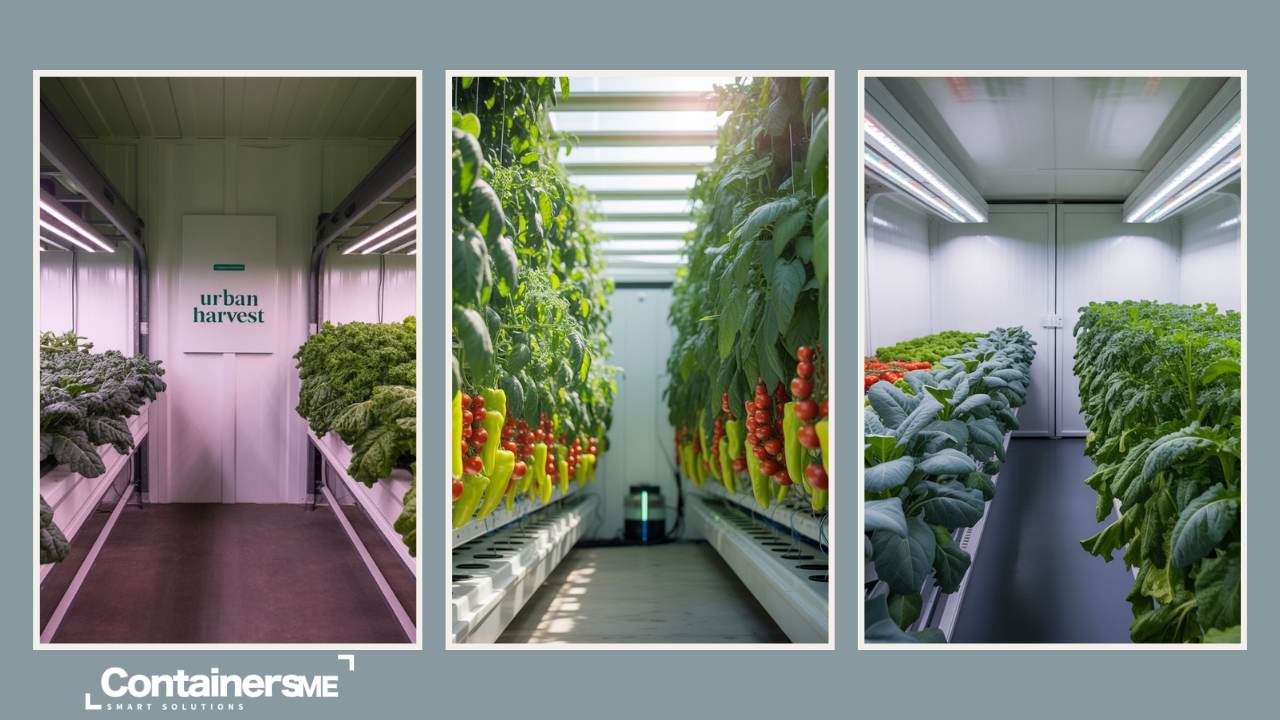
Nutrient Film Technology (NFT) and Deep Flow Technique (DFT) are popular hydroponic systems. However, they differ in their nutrient distribution methods.
Nutrient Film Technique (NFT)
- Nutrient delivery: An ultra-thin film of nutrient solution is continuously sprayed over the roots.
- Exposure to Roots: The roots are alternately exposed to air or a nutrient-rich solution.
- Oxygenation Increased oxygen concentrations due to air exposure.
- Low Water usage because of continuous recirculation of the nutrient solution
- Support for Plants: Net pots or other structures can support plants.
Deep Flow Technique (DFT)
- Nutrient delivery: An even deeper layer of nutrient solution is continuously pumped over plant roots suspended on rafts or channels.
- Exposure to Root Solution: The roots are immersed in the nutrient solution for long time.
- Oxygenation Needs to aerate the solution to maintain oxygen concentration.
- Uses large amount of solution to flood the root zone
- Plant support: Plants typically are supported by floating rafts
In conclusion, we can say that:
- NFT works best for leafy, delicate greens that need high oxygen levels.
- DFT has more applications and is suitable for plants with more extensive roots.
Hydroponics is a sustainable and efficient method of cultivation. The best option will be determined by the farmers choice of crop, expertise and resources.
Key Operational Factors needed for Container Farming Success
Pursuing the highest level of operational efficiency in container farming requires focusing on a few key elements essential to your farm’s success. They include:
An efficient irrigation system.
It is essential to have irrigation in your container farm. A well-designed system will provide the correct amount of water at just the appropriate time to ensure that your plants receive the required water without depleting this precious resources.
Nutrient dosing
Nutrient dosing needs to be done carefully. Plants’ nutrient intake must be adapted to the specific growth stage and provide the ideal amount of nutrients to promote good development.
Control of the climate
The control of climate is a crucial aspect. To maintain the optimal conditions for humidity, temperature, and airflow, you can make the best cultivation conditions throughout the year regardless of the conditions. This makes containers stand out by providing consistent and stable production.
Conclusion
In conclusion, container farming is a revolutionary approach to agriculture that offers numerous benefits, including year-round production, reduced water and land usage, and improved food quality. By embracing this innovative technology, farmers can increase their efficiency, sustainability, and profitability.
Containers-ME, the leading container supplier in the UAE with thousands of projects experience, is ready to give you the solutions you need to do well. Contact us today to ensure precision in every measure in container solutions.
View our projects

